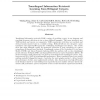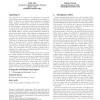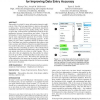499 search results - page 40 / 100 » Search Engines that Learn from Implicit Feedback |
118
click to vote
AI
1998
Springer
14 years 11 months ago
1998
Springer
Translingual information retrieval (TLIR) consists of providing a query in one language and searching document collections in one or more di erent languages. This paper introduces...
HT
2005
ACM
15 years 4 months ago
2005
ACM
This paper introduces a new method for linking the world view of the search engine user community with that of the search engine itself. This new method is based on collecting and...
111
click to vote
WWW
2011
ACM
14 years 6 months ago
2011
ACM
Our objective is to improve the performance of keyword based image search engines by re-ranking their baseline results. To this end, we address three limitations of existing searc...
UIST
2010
ACM
14 years 9 months ago
2010
ACM
Data quality is critical for many information-intensive applications. One of the best opportunities to improve data quality is during entry. USHER provides a theoretical, data-dri...
ICDM
2010
IEEE
14 years 9 months ago
2010
IEEE
Cold-start scenarios in recommender systems are situations in which no prior events, like ratings or clicks, are known for certain users or items. To compute predictions in such ca...



